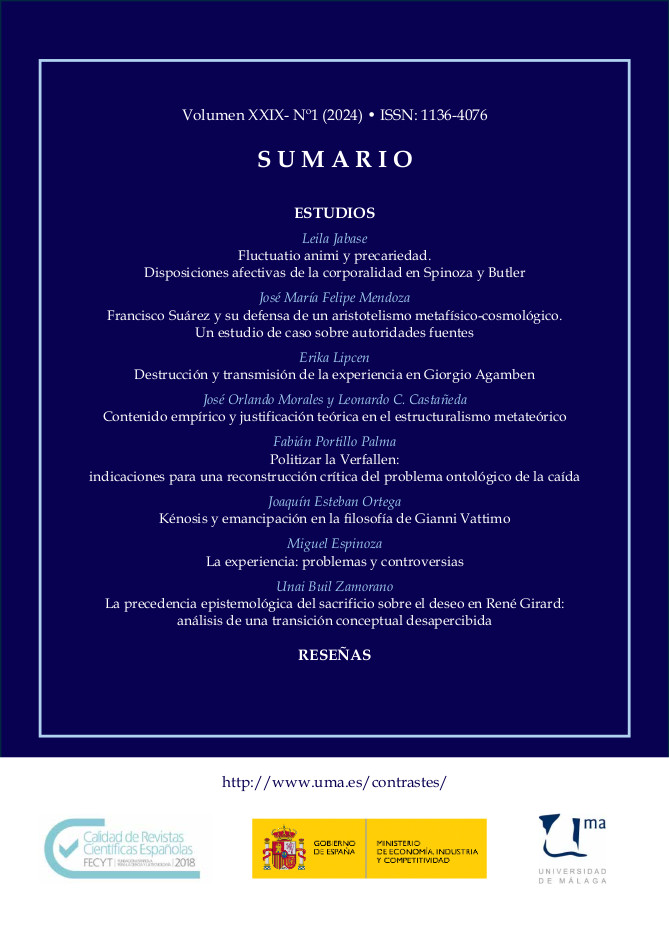Experience: Problems and Controversies
DOI:
https://doi.org/10.24310/contrastes.29.1.2024.16414Keywords:
experience, induction, natural science, theory, metaphysicsAbstract
The concept of experience is rich and appreciative. The way in which its content is described determines a type of philosophy. If one thinks, for instance, that only something material can be the object of experience, one is ontologically materialistic. Recourse to experience is part of the definition of science, and since the scientist elaborates universal laws to explain, the main epistemological issue of the relation between experience and theory is the problem of induction. Empiricist philosophy takes great account of the way in which the empirical sciences draw on experience. Now, since these sciences have become highly theoretical by postulating the existence of unobservables, both the empiricist and the scientist have no other option except to recognise that there is a continuity from experience to theory and from science to metaphysics.
Downloads
Metrics
Publication Facts
Reviewer profiles N/A
Author statements
Indexed in
-
—
- Academic society
- N/A
- Publisher
- Universidad de Málaga
References
ARISTOTLE (1941), Physics, edición The Basic Works of Aristotle. Nueva York: Random House, Inc.
BACON, F. (2000), The New Organon. Cambridge: Cambridge University Press.
ESPINOZA, M. (2020), A Theory of Intelligibility. A Contribution to the Revival of the Philosophy of Nature, Toronto: Thombooks Press.
HUME, D. (1963), An Enquiry Concerning Human Understanding and Other Essays. Nueva York: edición Washington Square Press, Inc.
KANT, I. (1929), Critique of Pure Reason. Nueva York: edición St. Martin’s Press.
LALANDE, A. (1929), Les théories de l’induction et de l’expérimentation. París: Boivin.
LARGEAULT, J. (1979), Hasards, probabilités, inductions. Toulouse: Association des Publications de l’Université de Toulouse-Le Mirail.
NEURATH, O., CARNAP, R., MORRIS, Ch.W. editors (1938), International Encyclopedia of Unifies Science. Chicago: The University of Chicago Press.
RUSSELL, B. (1950), An Inquiry into Meaning and Truth. Londres: George Allen & Unwin.
THOM, R. (1972), Stabilité structurelle et morphogenèse. París: W.A. Benjamin, Inc.
Downloads
Published
How to Cite
Issue
Section
License
This journal provides immediate free access to its content under the principle of making research freely available to the public. All content published in Contrastes. Revista Internacional de Filosofía, are subject to the Creative Commons Attribution-NonCommercial-ShareAlike 4.0 license whose full text can be found at <http://creativecommons.org/licenses/by-nc-sa/4.0>
It is the responsibility of the authors to obtain the necessary permissions of the images that are subject to copyright.
Authors whose contributions are accepted for publication in this journal will retain the non-exclusive right to use their contributions for academic, research and educational purposes, including self-archiving or repository in open access repositories of any kind.
The electronic edition of this magazine is edited by the Editorial Service of the University of Malaga (Uma Editorial), being necessary to cite the origin in any partial or total reproduction.










5.png)
